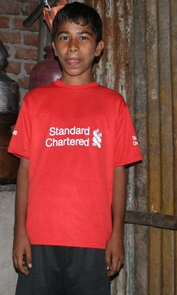Slum dreams: Mumbai to LFC
Deep within the confines of the Ambedkar Nagar slum in Mumbai, there's a shack, no bigger than a typical garden shed, that 13-year-old Montesh Bankar is proud to call home

It's a home that houses not just Montesh, one of 2,700 students at the nearby Colaba Municipal School, but also his mother and father, who have lived there for 20 years, his sister, two brothers and uncle. There is no bed or seat of any kind in the shack, just a stone floor on which the family sleeps. It's on this floor, as he lies awake at night, that he dares to daydream about one day emulating his idol Steven Gerrard and playing for Liverpool.
If it's a dream that sounds outlandish - that this little kid from a slum in Mumbai, over 4,500 miles from Merseyside could escape from the poverty that engulfs over eight million people in this city and one day pull on the red shirt of Liverpool - that's probably because it is. But, football is nothing if not a sport where miracles happen and this week Montesh's dream of making it as a professional footballer moved a tiny step closer to becoming more than just another pipedream from the slum, a story so far-fetched that even the giant Bollywood studios that dominate the city would struggle to sell.
Locating Montesh's home is no easy task. It's hidden away in the heart of the slum, down endless tight alleyways, past the water-filling stations, the barbers, the laundrette and just yards away from a swamp that seems to house the entire community's sewerage. Fortunately, Montesh is on hand to guide us. When we first meet him, he's stood at the entrance to the Ambedkar Nagar slum with six friends. He's wearing a red t-shirt with the Standard Chartered logo across the front. It's the same logo that appears on the front of his friends' shirts; fake LFC replica tops bought for 200 rupees from a stall on 'Fashion Street'. The number 8 and name Gerrard appear on the back of the counterfeit shirts but on the back of Montesh's, it's different. Instead of the captain's name, it's two words: Go Forward.

Launched to much fanfare back in September when former captain Phil Thompson travelled to Mumbai to kick-start the joint initiative between LFC and Standard Chartered, Go Forward was set up as a six-month project to give poor children from Mumbai a unique opportunity to not just receive expert football tuition - something many of them just can't get at school - but also the once-in-a-lifetime chance to showcase their skills in an exhibition match against the city's rich kids in front of talent scouts from the Indian Premier League and, hopefully, those from the English Barclays Premier League. It's a project that started with 2,200 kids from over 80 different municipal state schools in Mumbai competing for just 40 places - 32 for the boys and eight for the girls. The initial trials - an elimination process administered by the state of Maharashtra football coaches and made up of a mixture of skills tests, ball drills and matches - saw the number of contestants cut from 2,200 to 650. The second set of trials - which took place over one weekend in October - got the numbers down again to the final 40. Fortunately for Montesh, he made the cut.
It's because of Go Forward - and his involvement in the four-month final stage - that Montesh now finds himself leading a camera crew from LFC TV through his slum. If the Go Forward t-shirt he proudly wears didn't single himself out amongst his peers within this community then the man with the TV camera filming his every move certainly does. In Ambedkar Nagar, Montesh is flirting dangerously close to being famous - for today at least. A crowd of children - not just his friends flanked in their Liverpool shirts but also countless other kids off school because of the holidays - follow Montesh and the LFC TV cameraman towards his home. When we finally arrive at our destination and set up for the interview in the tiny room, there must be 30-40 people stood outside, straining to look in. Montesh might still be a million miles away from fulfilling his dream but just to have made it this far - with a chance of being spotted by a Premier League scout, any Premier League scout - is already seen as a big achievement in Ambedkar Nagar.
"It's such a big thing for Montesh to be involved in Go Forward that even just having this t-shirt is a cause for celebration," admits his excited mother Saudu. "His friends beg him to let them wear it just for half an hour, so they all take turns walking around in it. We never even dreamed that our son would get this opportunity to be coached by Liverpool Football Club. This sort of thing doesn't happen for boys like Montesh. When he attended the first trial, we never imagined he would make it through to the end but he's done it and we're so proud. He's completely crazy about football. He never wants to eat, he just wants to play. He'll get up at 4am and go out training on his own. He's already won two trophies with his team and even though there were times when we couldn't really afford the 30 rupees (about 40p) to pay for the bus fare for him to go and play, we paid the money. In my soul, I really believe he'll make it."
Now 13, Montesh's love affair with football began six years ago. He'd play on the waste ground near his slum and, later, in the tiny concrete playground that he shares with over 2,000 students at his school. In most state schools in Mumbai, sport just doesn't figure on the curriculum. When many classrooms don't even have a desk for each child, sport is viewed as a luxury. In a city bursting at the seams with over 20 million inhabitants and hundreds more arriving each day, space is at a premium and, as such, there's no such thing as a school playing field. Not in the schools kids like Montesh attend anyway. What his school does have however - and without it he'd probably never have made it this far - is a headmaster who understands the importance of football.
Sat in his office inside this depressing-looking grey concrete block that passes for a school, Mr Ambasing Magar talks passionately about Rakesh Sakpal, a Colaba Municipal School student, who was recently spotted by scouts from Queens Park Rangers. Along with another local boy, Praful Kumar, from Navy Children School, Rakesh has been invited to go to England for an extended trial with the London club after Christmas.
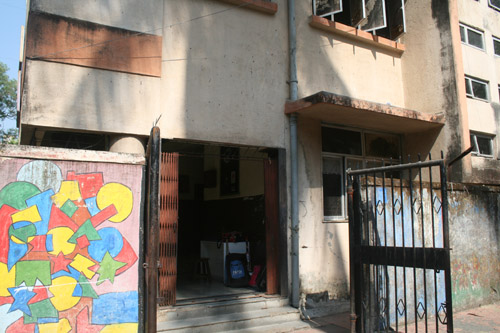
On Ambasing's desk sits a trophy that one of the school's football teams won recently. To hear him talk, it's obvious that he's as proud of the footballing achievements of his students as he is about their academic success.
"It's very difficult to keep kids from the poor areas in school," he says, "but through football, we are giving lots of them a reason to turn up every day. We say if you don't study or come to school, you can't play in our football team. Lots of kids from the slums are almost encouraged by their parents to drop out of school and start earning money to support their families - particularly girls - but we work really hard to keep them here. Our children in this school are the sons and daughters of drivers, maids, construction workers and fishermen. Their families have very little money so the children have to contribute, so we'll have some boys who'll turn up for school in the morning having been up working with their fishermen fathers at 4am. In the slums, clean water is only available for a few hours each day and some parents will want their kids around to help fetch it while it's available - which means they can't come to school. We'll lose some kids for two years before we can persuade their parents that they need to come back and get an education. The kids who do come though are so passionate about football it puts the rich kids to shame. These kids are hungry, the rich kids aren't."
For those who don't know Mumbai, it's a city of extreme contrasts. The western image of slums and chawls, as depicted by the opening scenes of the film 'Slumdog Millionaire' only tells half the story. Mumbai has more millionaires than Manhattan and is currently the third most expensive city in the world to buy property in. Driving from the airport, you'll see whole families of pavement dwellers - people who can't even afford to live in a slum - asleep on the floor outside Rolls-Royce and Aston Martin showrooms. There's plenty of money here - it's just that only a small section of the population gets to enjoy it.
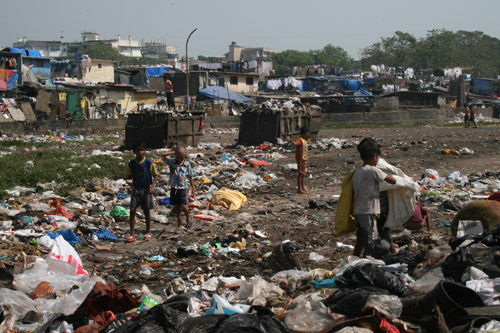
"A lot of the rich kids from the Ivy League schools are more interested in hanging around the malls or going to the multiplexes than playing football," claims Rajiv Daryanani, the team manager of the Colaba Municipal School. "It's amazing because they have all the facilities but they waste them. The private schools will only have 25 students in an air-conditioned classroom while we'll have 60 boys and girls in a small room with not enough desks. They have their own football and cricket pitches while our playground is too small for the 2,700 boys and girls. The kids here will play anywhere - they'll be playing football in the corridors or out on the road in front of the school, emulating their heroes like Steven Gerrard who they watch on the television. That's why, given the opportunity, our boys can compete with the best schools in Mumbai on a football pitch. When the Go Forward project was launched, every state school jumped at the chance to get involved. The Ivy League schools couldn't understand why Liverpool and Standard Chartered were more interested in helping the poor schools than the rich ones with Go Forward but that's the whole point of it - to provide an opportunity for these kids that didn't exist before. With the right coaching, these kids can grow up and put Indian football on the world map."
That India, a country with over 1.2 billion people, has never produced a single player to grace the English Barclays Premier League, is down to one thing: cricket. Cricket is not just a sport in India; it's an obsession and the cricketing authorities actually have a vested interest in suffocating coverage of all over sports in the country's media. Things seem to be changing however.

"In 15 years, cricket will be over in India," that's the outrageously bold claim of Arshad Hussain, a qualified football coach for the state of Maharashtra, within which the city of Mumbai falls. A Go Forward coach, he's here today at the Western Railway Sports Ground in Lower Parel to observe and learn from the LFC coaches as they train the youngsters. "The kids in India aren't interested in cricket anymore. It's tedious, it lasts too long and it's no longer exciting. The last football World Cup attracted far more interest than the last Cricket World Cup and we won that. Football is particularly popular amongst the poor kids because all you need to play it is a ball. Kids will play football barefoot if needs be and they can practice on their own in a tiny space. It's not like that with cricket - you need more than one of you, you need space and on top of that, you need all the paraphernalia - the bat, the ball, the gloves, the stumps - and lots of kids can't afford that. What football in India needs though is a proper structure, a proper long-term plan. The kids here today are not at the level of the kids Liverpool will train back home in England and the reason for that is they've never had the proper coaching they need. Can you believe that in our entire country, there's maybe only 20 to 30 coaches with the A Licence? We need more qualified coaches to train the kids otherwise they can't progress. Just being able to spend time talking with Ian Rush today was so important to me because I got to discuss youth development in football with him. He understands what we are lacking and what we need to do to improve things. That's why this football clinic has been so useful to us coaches because we've had sessions called 'train the trainer' where the Liverpool coaches will train the Go Forward coaches. We're learning so much from them and these sessions will leave a lasting impact on football here in India. If we become better coaches than we can help other coaches improve and if they improve, the kids improve."
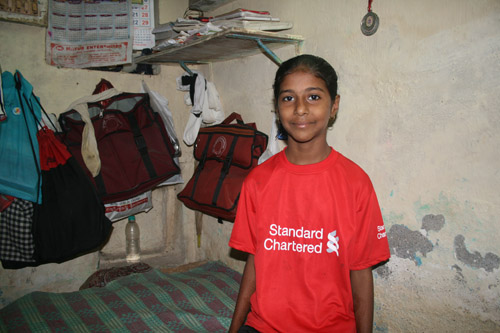
Away from the main pitch, where the 32 boys are being coached, the eight girls who progressed through the Go Forward trials are being put through their paces by Rishi Jain and Mark Bygroves, Liverpool's Social Inclusion Officer and Respect 4 All Co-ordinator respectively. The most talented of the group, according to Rishi, is a tiny 12-year-old called Lucky Sandhu. When we first met her yesterday, she was at home in the Backbay Depot slum, a few miles from where Montesh lives. Like the first slum we visited in Ambedkar Nagar, it was a hive of activity. A huge rubbish tip, 100 yards from the tiny one room, one-bed cabin that the family of five share, seemed to be the only open space for the kids to play in. There's cricket games, football matches and makeshift kites being flown by kids as young as four. A few older children, carrying large white sacks, sift through the rubbish to see if there was anything that could be recycled or sold, even for just a few rupees.
This is Lucky's playground; the playground where she learnt to play football. Like Montesh, she considers herself a striker and talks about her hero Steven Gerrard. He seems far and away the most recognisable Liverpool player amongst the kids from the slums. She's been playing football for two years and would like to play for Liverpool when she is older. Only 11 girls from her school currently play football but that number seems to be growing every week. Girls in India, particularly poor girls, aren't encouraged to play sport but it's something the local school authorities and charities here in Mumbai are keen to change. That's why it was so important that the Go Forward project wasn't exclusively for boys.
"When Lucky came home from the trial where she was selected to be one of the final eight girls, she was so excited to tell us her news," recalls her father Bhaskar Sandhu. "She got off the bus and ran all the way home to tell us she'd been picked. Everyone is so proud of her. This is such an amazing opportunity for her."
Kalyani Subramanyam, who heads up Standard Chartered's 'Goal' girls project in Mumbai, an initiative designed to use netball to get girls involved in sport and teach them important social messages, is delighted that Lucky is doing so well at football. "Lots of girls never experience sport in Mumbai," she says. "There's pressure on them from their parents to drop out of school and start helping around the home, whether that's looking after their younger brothers or sisters or earning money for the family. There's also pressure on the girls to get married early and have babies but these girls have rights too. They're children and if Lucky want to play football for Liverpool, why shouldn't that be her dream?"
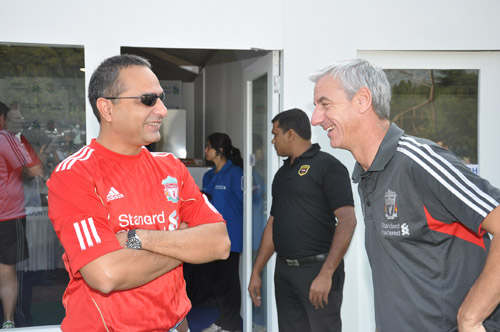
"It's an exceptionally humbling experience to watch these young children being trained by Ian Rush and the LFC coaches and to know that we've helped make this happen," insists Sumeet Singla, Standard Chartered's Regional Head of Corporate Affairs for India and South Asia. "When we teamed up with Liverpool to launch Go Forward, our number one objective was to provide an opportunity to a section of society here in Mumbai that otherwise would never get an experience like this. We wanted to help identify the football talent in a place where no one has ever looked before and give these boys and girls the platform to not only learn from great coaches but also showcase their skills in front of scouts from big clubs that otherwise would never have found them.
"Football really resonates with the youth in India and the fact that Liverpool FC are here taking an interest in young kids from Mumbai can only be a good thing for helping grow the sport here. If together we can make a small difference to these children's' lives and help make their dreams come true then Go Forward will have been a success."
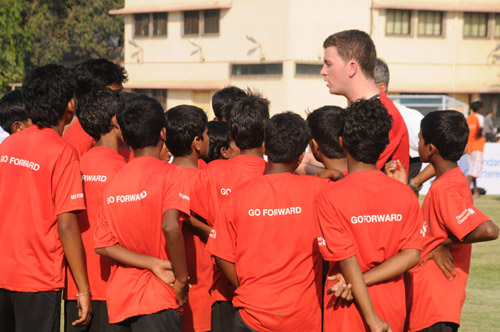
If India is to develop into a nation that is as famous for football as it is for cricket then it needs its own hero. That's the view of Ian Rush, who has spent the last three days taking a keen interest in not just the Go Forward project but also Indian football in general. "It's great that the kids we've met have Steven Gerrard on the back of their shirts but they need their own Steven Gerrard," he says. "They need their own idols just like they have in cricket. They need someone of their own to look up to and aspire to be like. Look at Korea, they have Park ji Sung. He's their hero. If they can emulate him first then they can try and move up to the Steven Gerrards of this world."
Whether Montesh Bankar or Lucky Sandhu grow up to be the first real heroes of Indian men's and women's football respectively remains to be seen. The odds might be stacked against them but the kids from the slums of Mumbai are nothing if not ambitious.
"No one from a slum has ever played football for India," Montesh tells me before heading back to Ambedkar Nagar after his first coaching session with Liverpool, "but I'm going to do it and when I've done that, I'm going to play for Liverpool like Steven Gerrard."
We wish them luck.
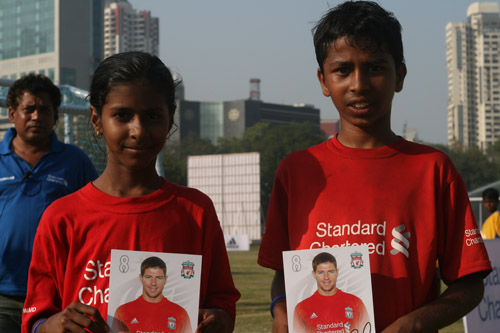
To see photos from Liverpool FC's trip to Mumbai, click here to visit our official Facebook page


